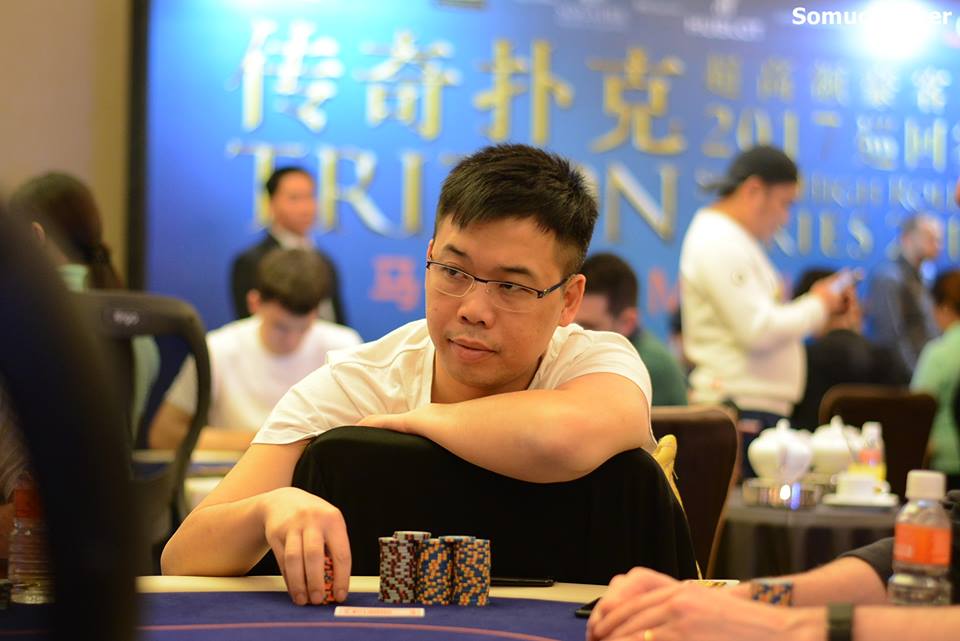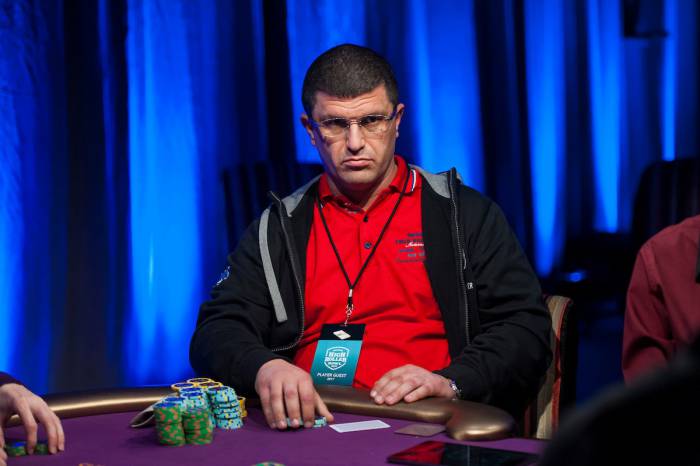Elton Tsang Poker Sheds New Light on Recent Tsoukernik Scandal
Elton Tsang is not your average poker player. While his recent win in the Big One for One Drop will have brought his name to the attention of the masses, to those who inhabit the elusive super high stakes cash games in Asia, Elton Tsang is already well known. Not only has he been a highly successful cash game player for a long time, but he also helped pave the way for poker, and PokerStars to take root in Macau.

Here, we relay some of the most interesting details revealed by his recent interview with Calvin Ayre’s Lee Davy.
In this interview, Elton Tsang talked about his beginnings, and his participation in Asia’s biggest games. In the second part of this interview, he also made serious allegations against Leon Tsournik, who allegedly refused to pay him his winnings after a high stakes cash game.
Canada and beyond
Elton Tsang was born in Canada and it was while attending The University of British Columbia that he first encountered poker. He spent most of his poker sessions playing $2/$4 Limit Holdem on PartyPoker, and soon built up a healthy bankroll. Upon graduation, Tsang began to explore poker based opportunities in Hong Kong, and with the game largely undiscovered there, business opportunities would also walk hand in hand with poker. His first successful venture came in the form of a poker tournament that he persuaded the Grand Waldo Casino in Macau to host. The idea was that new customers would be drawn into the casino by the tournament, and would continue to gamble while there. He soon had top class tournament director Matt Savage on board, and managed to negotiate sponsorship from PokerStars, who were keen to explore opportunities in Asia too.
The APPT arose from Tsang’s efforts, and grew to become one of the leading tournament festivals in Asia, although by that time, Tsang had moved on to other things. One of the positive things that he gained from the APPT though, was inspiration. Seeing professional poker players enjoying themselves on the circuit while earning a living, he decided to put more work into his own game, in the hope of emulating them.
Turning Pro
The professional career of Elton Tsang built upon the online foundations he had already laid, and with a support group of friends who were also poker enthusiasts, he soon managed to win a seat at the PCA through an online satellite. His 37th place finish netted him $32,000 which helped him find his feet in the professional world. Before long, he turned to live cash games, and began taking part in a regular poker game at The Poker House in Hong Kong. This establishment had been running for almost a year without any legal problems, and perhaps naively, Tsang believed that the poker games there were entirely legal. With this assumption, he and a few friends opened their own poker room which was very similar, called The Blue Room. They only managed to remain open for three months before they, and also The Poker House were shut down.
Despite this failed business venture, Tsang did not have any serious financial worries, as his poker playing was providing a lucrative source of revenue. He had moved up to HK$50/HK$100 (US$6/US$12) and found himself profitable there, although by his own admission, it took longer for him to become established at HK$100/HK$200 ($US12,5)/$25. He credits pros such as Matt Kirk , David Ewing and John Hoang with being tough opponents in those games that he learned a lot from, and by a curious quirk of fate, it was John Hoang who he eventually overcame heads-up to lift his first tournament title, adding over US$71,000 to his bankroll in the process.
With his bankroll significantly padded, Tsang spent the next two years grinding live cash game in Macau, where he eventually moved up to the HK$300/HK$600 (US$40/US$80) tables. PLO soon found its way onto the cash game tables in Macau, and with online experience in PLO working in his favour, Tsang took some successful shots at the HK$1,000/HK$2,000 tables (US$125/US$250) and ran well enough to make himself financially comfortable.
Playing the biggest game in the world
From HK$1,000/HK$2,000 PLO (US$125/$250), Tsang found himself sufficiently rolled to sit in the biggest games around. HK$10,000/$20,000 (US$1,250/$2,500) and HK$20,000/$40,000 (US$2,500/$5,000) became his games of choice, and he was soon being stared down by the likes of Phil Ivey, Patrick Antonius, Tom Dwan and Johnny Chan, along with local Chinese pros. Despite having to drop back down and rebuild with PLO games a few times, Tsang never lost faith in his ability to prosper in the biggest game, and eventually, his results began to back up his belief.
When pressed about the size of his biggest pot, Tsang approximated the eye watering number to be around HK$100,000,000 (US$12,700,000).
He recounted one session that could have ended his professional aspirations, before a change in fortunes rescued him:
“I was in Macau playing three-handed with Tom Dwan and the Chairman. That game, we were playing HKD Ten Million dollar buy-in (USD$1.2m) HK$50,000/HK$100,000 (USD$6/$12k) No-Limit. After playing 24-hours, I had lost HKD$60 million (USD$7.6m). That was my stop-limit. I was ready to quit. But then I ended up giving it one more bullet. I bought in for another HKD$20m (USD$2.5m) and had I lost it I would have had to move down in stakes and start all over. I was fortunate enough to win all my money back, and HKD$60m on top of that. It was the most important game of my life.”
Playing for millions against Leon Tsoukernik and the dispute that followed

Elton Tsang may have made headlines by winning the Big One for One Drop in Monte Carlo last year for 11,111,111 Euros, but the allegations he put forward at the end of his interview with Calvin Ayre have also added a new chapter to an existing news story.
Back in August last year, Tsang decided to join a few friends who were attending EPT Barcelona, and while there, he was introduced to Leon Tsoukernik who was putting a cash game together. It was €1,000/€2,000 with a €4,000 straddle. Tsang soon found himself down by €1,400,000 while playing against the likes of Fedor Holz, Daniel Cates, Richard Yong, Winfred Yu, Tony Guoga and Leon Tsoukernik. By the end of the session, Tsang had turned it around and was €1,320,000 in profit. Tsoukernik wrote down what each player had won or lost, and the understanding was, that the Czech casino owner was in charge of distributing the chips, collecting buy ins and was also in charge of paying winnings.
The following day, Tsang was playing against Tsoukernik, Daniel Cates and Christoph Vogelsang and after three large pots against Tsoukernik, he finished the session +€3,375,000. According to Tsang, he was not paid his winnings that night, and was instead asked to meet Tsoukernik a couple of days later. During that meeting, he was told that the €1,320,000 from the first day would be paid to him, but the rest would not. Eventually, when Tsang refused to forfeit the winnings from the second day he was allegedly told by Tsoukernik that he felt the game was not fair, as Tsang had called whenever he bluffed and folded when he had a real hand. After months of trying to reason with him, Tsang says he accepted €1,200,000, in the hope that the rest would eventually be paid. He also claims that Tsoukernik had 90% of the Vogelsang and Cates’ action that night.
Gambling debts are not legally enforceable in Europe, and so Tsang was left with any options he says, other than to share his story with the public. This is not the first time he has had to deal with problems in this area, as Tsang also claims that friends over the years have borrowed money and been unable, or so far unwilling to pay him back. He claims that the total amount he wasowed by other players reached at a point over US$12,000,000. This debt hurt the most, he said, partly because it was an outright refusal to pay.
Tsang also described a more sinister side to the situation when he said: “Leon sent a lot of people to talk to me during this time, and they hinted to me that Leon is not a boy scout and stuff like that. Hinting that he has a background, etc, etc. I’m like whatever, if he is going to kill me, he is going to kill me.”
The story put forward by Tsang has echoes of a story which arose recently concerning Matt Kirk and Leon Tsoukernik. Kirk claims that the casino owner refused to pay him $2,000,000 he owed after a cash game session, and he has since taken legal action against Tsoukernik.
More: $2M Legal Dispute Underway Between Matt Kirk and Leon Tsourkernik
When Calvin Ayre contacted Tsoukernik, he made a statement in which he said: “As much as I would like to specifically address the completely erroneous statements made by Elton I cannot, due to the fact that I am involved in pending litigation. I will say this, Elton’s account of the events is fiction and it fails to address the specific facts which lead to an extremely revealing and embarrassing situation for him.”
He went on to say: “Unfortunately, I have come to learn that some people take advantage of knowing me and target me when I play poker cash games. I have thus experienced a variety of practices in the game which corrupt the sport of the game. For example, poker collusion, marked cards, and hired professionals. I have many stories to tell, but I prefer to fight it my own way with the support of the courts of justice and other poker entrepreneurs instead of fighting rumours and lies over the internet. I believe in justice. People carrying out these actions know that the only way they can affect me is spreading their lies and stirring negative PR. I am not afraid of this.”
More: Read Eton Tsang’s complete interview: Part 1 – Part 2 (CalvinAyre.com)
Article by Craig Bradshaw



















